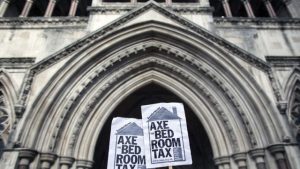Carer is ‘devastated’ at housing benefit cut ruling
Five disabled social housing tenants have lost their Court of Appeal bid to have benefit cuts for those deemed to have spare bedrooms ruled unlawful.
Judges said the court could not intervene in the government’s “controversial” housing benefit changes – dubbed a “bedroom tax” by critics.
Lawyers for the group had argued the regulations applying in England, Wales and Scotland failed to reflect the accommodation needs of disabled people.
They said they planned to fight on.
The court also ruled against two lone parents who claimed the government’s cap on the total benefits paid to families violated human rights laws and common law because of its impact on vulnerable families.
‘Devastating impact’
He said the court could intervene only if the measures “were manifestly without reasonable foundation” and he ruled that stringent test was not satisfied and both challenges must fail.
But Ugo Hayter, who represents two of those fighting the changes, said they were “baffled” by the Court of Appeal’s findings and were considering taking the case to the Supreme Court.
“The court recognised that our clients and thousands of disabled people across the UK had a need for accommodation not provided for by the new housing benefit rules, however the court decided that disabled tenants should not have their housing needs met on an equivalent basis to their able-bodied counterparts, just because they are disabled.
“Instead disabled tenants are being forced to rely on short-term and discretionary payments.”
And Anne McMurdie, whose firm represents three of the appellants, said: “Disabled tenants are not asking for extra funds – they are asking for housing benefit to be paid at a level which meets their needs – for the same right as others. Discretionary payments are not the answer.”
Jayson Carmichael, from Southport, Merseyside, who was one of the appellants, said he was “devastated” by the ruling.
He said: “It’s ludicrous because human rights laws have been implemented by tribunal judges up and down the country. I think we’re just being made an example of because of our high profile in this group case.”
Richard Kramer, deputy chief executive of national deaf-blind charity Sense, said it was “extremely disappointed” with the outcome.
“Although this decision concerns the cases of five individuals, the impact of this policy has been devastating for many disabled people,” he said.
National Housing Federation head of policy Kevin Williamson said the court action showed “how desperate” people had become.
He said: “Disabled people across the country are being forced to cut back on food and heating to pay the bedroom tax.”
Richard Hawkes, chief executive of disability charity Scope, described the ruling as “a setback for the campaigners and a major blow for the 400,000 disabled people who are feeling the impact of this policy”.
Reform ‘essential’
The Department for Work and Pensions, which was a defendant in both cases, welcomed the rulings.
“Reform of housing benefit in the social sector is essential to ensure the long-term sustainability of the benefit. But we have ensured extra discretionary housing support is available for vulnerable people,” a spokesman said.
Referring to the benefit cap, the spokesman added: “We are pleased that the courts have ruled again that the benefit cap complies with the European Convention on Human Rights.
“The benefit cap sets a fair limit to what people can expect to get from the welfare system – so that claimants cannot receive more than £500 a week, the average household earnings.”
Since April last year, people deemed to have one spare bedroom have had their housing benefit reduced by 14% while those with two or more spare bedrooms have seen reductions of 25%.
The challenge to the change originally concerned 10 families but five cases involving disabled children are no longer being pursued because they have since become subject to an exemption from the benefit cut.
The group includes wheelchair user Richard Rourke, 46, from Bakestone Moor, Derbyshire, who says he needs an additional bedroom to store mobility equipment.
Among the others involved in the case is Mr Carmichael’s wife Charlotte who says her spina bifida means she is unable to share a bedroom with her husband, who is also her full-time carer.
